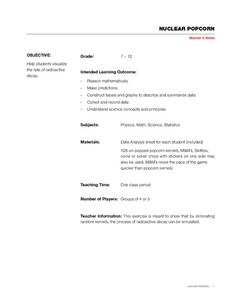Dr. Panda
Dr. Panda's Veggie Garden
Friends arrive at the farm and aspiring agronomists help the farmer to grow what the friends want. With adorable animation and charming background music, little ones practice virtual gardening and farming while developing cognitive...
Middle Tennessee State University
The Invention of the Telephone
All of the people in your class would agree that life would be different without the invention of the telephone! Study Alexander Graham Bell's most famous and influential invention through the primary source document of his...
Science Matters
Celery Lab
See firsthand the work plants do to move nutrients through their systems with a lesson that demonstrates the role of the xylem and phloem in plants. Young scientists observe celery move colored water through its stem to the leaves and...
Curated OER
Life of an Island: From Mountain to Atoll
Students research the evolution of a volcanic island from origin to erosion. They determine the relative ages of the Northwestern Hawaiian Islands given their position in the archipelago.
Curated OER
Comparing Mitosis with Meiosis
Life science learners view an online animated mini textbook comparing two types of cell division. Working in groups, they use a digital microscope to capture images of cells in different stages of mitosis and meiosis. Then they create an...
Curated OER
Refining the Why? Turning Student Questions into Research
Middle schoolers have years of experience when it comes to how their bodies work. Surely they have some questions as well. Here is an opportunity for them to practice the scientific method in an attempt to answer some of those questions....
Curated OER
How Do Cells Reproduce?
Students examine cell division and the process of mitosis. In this cell reproduction lesson students grow yeast and observe the results, and learn about the career of scientific illustration.
Curated OER
Up the Down Tree House
Students investigate the decomposition process. In this ecology lesson, students participate in a play, "Up the Treehouse" where the main idea focuses on a decomposing tree and how food chains are effected by decomposition. After the...
Curated OER
"A Typical Day at Seaworld" one day visit
Explore the business side of careers in zoological or marine parks. Learners use the internet, field trips, and their research skills to develop an understanding of what skills are needed to work in an animal park environment.
Curated OER
Photosynthesis
Students are introduced to the process of photosynthesis. In groups, they test the effects of the lack of sunlight on plant leaves and compare the results with their hypothesis. They note the characteristics that plants and animals share...
Curated OER
Little Bees, Big Potential
After reading an article on the alfalfa leafcutting bee, learners chart its characteristics alongside those of the honeybee. Then they draw the leafcutter lifecycle. The article provides fascinating reading when studying the role of...
Curated OER
9th Grade
Ninth graders discuss the principal source of energy entering the marine ecosystem. They name some of the autotrophs at the Maui Ocean Center. Students name some of the heterotrophs at Maui Ocean Center. They are taught that plants are...
Smithsonian Institution
Watching Crystals Grow
Amazing science can sometimes happen right before your eyes! The class gets cozy as they watch crystals grow. They use Epsom salts, rocks, and food coloring to create crystals. They'll observe the entire process, documenting every step...
Curated OER
Classification: Dichotomous Key
Students investigate the classification process and nomenclatures used for classifying organisms. They study dichotomous keys to identify organisms with 90% accuracy. Students organize information regarding the relatedness of species.
National Museum of Nuclear Science & History
Nuclear Popcorn
Make your lesson on radioactive decay pop with this lab exercise. Using popcorn kernels spread over a tabletop, participants pick up all of those that point toward the back of the room, that is, those that represent decayed atoms. As the...
Curated OER
Who Wants to be a Millionaire? Human Body Systems and Plants
Fifteen multiple choice questions review a variety of biology topics. In game-show fashion, viewers answer questions about a plant's needs, the skeletal system, and the cardiovascular system. If you happen to teach these three topics...
Curated OER
Feeding in the Flow
The National Oceanic and Atmospheric Administration (NOAA) has developed a tremendous library of ocean-themed lessons that can be used in a variety of science settings. "Feeding in the Flow" is one of those activities; Its focus is on...
Curated OER
Muscular and Skeletal Systems
How do muscles move bones? Find out using a built-in-class model. Pupils construct a hand model with paper and string, then follow a series of directions to explore the movement process. Discover additional information about the muscular...
Tracy Pendry
Cardiovascular/Circulatory System
Explore the circulatory system with a cardiovascular pump activity that promotes discovery and discussion as class members create a functioning model of the heart. Continue the learning process through a web quest showcasing the...
Curated OER
Functional Homes
Students observe and reflect on habitats built and used by various life forms. They discover the benefits of the "homes" to the creature and its life and apply the natural designs to human uses.
Curated OER
Nowhere to Hide
Students examine the topic of natural selection. As a class, they write their own definition to survival of the fittest and watch a video. Using the internet, they research how Darwin started to examine this process using finches and how...
Curated OER
Mitosis
Seventh graders explore the process of cell division. Students observe an animation of cell division. They draw the phases of mitoses. Students describe the phases of cell division and explain the events that occur during mitosis.
Curated OER
Investigating Properties of Water: Temperature
Investigate how temperature affects the density of water and stratification that occurs in bodies of water when temperatures vary. Water of differing temperatures is given different colors to see the layers that form. The lesson is meant...
Curated OER
Investigate Pine Creek!
Students are invited to become detectives in this Web-Integrated Science Environment (WISE) as they explore a local creek, its environment and ongoing status. Students participate in field trips, acquisition of data through water testing...

























